Muslim jurists’ support for monarchy in times of discord, as an alternative system to Islamic caliphate, was based on their understanding that Islam does not provide a specific framework to run the state affairs. It has been left to Muslims to decide about their system of government with mutual consultation and consensus. Once a social contract, or constitution, is agreed upon, its protection is obligatory. Similarly when democracy is related to solving problems with consultation and collective intelligence, then it is very much relevant to Islam. These views were expressed by eminent religious scholars and leaders in a one-day structured dialogue on “Democracy and constitution of Pakistan: viewpoints of clergy and religious scholars (III),” organized by Pak Institute for Peace Studies (PIPS) in Islamabad on September 1, 2014.
This was third of a series of dialogues that were designed to initiate academic and intellectual-level debate among religious scholars and clergy on some of the legal issues in Islam which confuse religious discourse and public opinion about democracy and Pakistan’s Constitution.
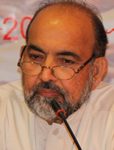 Dr. Qibla Ayaz, Vice Chancellor Islamia College University, Peshawar said that the trend of mobs taking over control in Somalia, Syria, Iraq, and Libya has now shifted towards Pakistan and it has the tendency of paralyzing the state. He gave contemporary Islamic perspectives on state, constitution, and democracy and stressed on the need of Ijtehad, which is one of the key sources of Islamic law and entails intellectual effort to derive appropriate legislation from the Quran and Sunnah for novel cases.
Dr. Qibla Ayaz, Vice Chancellor Islamia College University, Peshawar said that the trend of mobs taking over control in Somalia, Syria, Iraq, and Libya has now shifted towards Pakistan and it has the tendency of paralyzing the state. He gave contemporary Islamic perspectives on state, constitution, and democracy and stressed on the need of Ijtehad, which is one of the key sources of Islamic law and entails intellectual effort to derive appropriate legislation from the Quran and Sunnah for novel cases.
 The Council of Islamic Ideology’s former chairperson Dr. Khalid Masood stated that there is need to develop Ijma or consensus among Islamic jurists on certain questions of law such as caliphate and the rule of law. He said the concept of ‘caliph’ is often confused. Is caliph a representative of God or the people? Similarly, the rule of law has several meanings associated with it. He further stated that previously there was a concept of nation-state and the West separated morals from laws. Now morals and religion have also been separated from the state and a new idea of ‘global ethics’ has emerged.
The Council of Islamic Ideology’s former chairperson Dr. Khalid Masood stated that there is need to develop Ijma or consensus among Islamic jurists on certain questions of law such as caliphate and the rule of law. He said the concept of ‘caliph’ is often confused. Is caliph a representative of God or the people? Similarly, the rule of law has several meanings associated with it. He further stated that previously there was a concept of nation-state and the West separated morals from laws. Now morals and religion have also been separated from the state and a new idea of ‘global ethics’ has emerged.
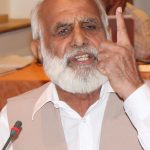 Professor Raja Muhammad Aslam Khan was of the view that transparency and accountability lack in Pakistan’s democratic system. He said there is need to maintain the rule of law in Pakistan and empower Pakistan’s federating units through decentralization.
Professor Raja Muhammad Aslam Khan was of the view that transparency and accountability lack in Pakistan’s democratic system. He said there is need to maintain the rule of law in Pakistan and empower Pakistan’s federating units through decentralization.
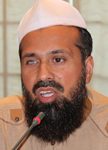 Allama Mumtaz Nizami said welfare of mankind should be the ultimate goal of a system of governance, irrespective of its type and nature. He said Islamic caliphate system essentially focused on human welfare through practical measures.
Allama Mumtaz Nizami said welfare of mankind should be the ultimate goal of a system of governance, irrespective of its type and nature. He said Islamic caliphate system essentially focused on human welfare through practical measures.
 Dr. Rasheed Ahmad said there is a need for studying other state models in the world to identify and adopt best practices. He stated that after the demise of Islamic caliphate system, differences arose leading to evolution of Sunni and Shia versions of Islam. He said we should try to have an in-depth study of the concepts of democracy and Islamic caliphate. At present we have three different models of governments in Muslim countries, he said: the Saudi model; the Iranian model; and the parliamentary model.
Dr. Rasheed Ahmad said there is a need for studying other state models in the world to identify and adopt best practices. He stated that after the demise of Islamic caliphate system, differences arose leading to evolution of Sunni and Shia versions of Islam. He said we should try to have an in-depth study of the concepts of democracy and Islamic caliphate. At present we have three different models of governments in Muslim countries, he said: the Saudi model; the Iranian model; and the parliamentary model.
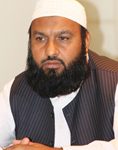 Mufti Muhammad Khateeb Mustafai said that Shura system of Islam, or system of mutual consultation, is democratic. As it has been made clear in the 1973 Constitution that no law can be made that is contradictory to the Quran and Sunnah, Pakistan’s Constitution is Islamic and everybody should respect and protect it, he argued. Also, Pakistan’s founder Quaid-e-Azam envisioned a democratic system for the country and the Pakistan Movement was a democratic movement. Majority of Pakistan’s religious scholars believe in the supremacy of Constitution and democracy in Pakistan, he stated.
Mufti Muhammad Khateeb Mustafai said that Shura system of Islam, or system of mutual consultation, is democratic. As it has been made clear in the 1973 Constitution that no law can be made that is contradictory to the Quran and Sunnah, Pakistan’s Constitution is Islamic and everybody should respect and protect it, he argued. Also, Pakistan’s founder Quaid-e-Azam envisioned a democratic system for the country and the Pakistan Movement was a democratic movement. Majority of Pakistan’s religious scholars believe in the supremacy of Constitution and democracy in Pakistan, he stated.
 Allama Abdul Qudoos Muhammadi highlighted the role of religious scholars and leaders in the making of Pakistan’s 1973 Constitution. He said it is unfortunate that different versions of Islam were followed in Pakistan under different rulers ranging from Zia’s enforcement of Islamic laws to Musharraf’s version of enlightenment.
Allama Abdul Qudoos Muhammadi highlighted the role of religious scholars and leaders in the making of Pakistan’s 1973 Constitution. He said it is unfortunate that different versions of Islam were followed in Pakistan under different rulers ranging from Zia’s enforcement of Islamic laws to Musharraf’s version of enlightenment.
 Dr. Munir Ahmad said we have been told that all the laws would be subordinate to Islamic teachings, the Quran and Sunnah. Our legal experts admit it. But that does not mean we need to negate the Constitution of Pakistan. There is room for Ijtehad and Ijma in Islam, keeping in view the spirit and overall framework of Islamic law.
Dr. Munir Ahmad said we have been told that all the laws would be subordinate to Islamic teachings, the Quran and Sunnah. Our legal experts admit it. But that does not mean we need to negate the Constitution of Pakistan. There is room for Ijtehad and Ijma in Islam, keeping in view the spirit and overall framework of Islamic law.
 Hassan Farooq said the present system of Pakistan can neither be called democratic nor Islamic, at least in practical terms. He said the Objectives Resolution made the essence of Pakistan’s Constitution Islamic but there is a difference of opinion on it.
Hassan Farooq said the present system of Pakistan can neither be called democratic nor Islamic, at least in practical terms. He said the Objectives Resolution made the essence of Pakistan’s Constitution Islamic but there is a difference of opinion on it.
 Mushtaq Ahmad gave the historical perspective of the evolution of Islamic laws in Pakistan. He stated that democracy is closest to Islam and there is need to follow it in its true essence.
Mushtaq Ahmad gave the historical perspective of the evolution of Islamic laws in Pakistan. He stated that democracy is closest to Islam and there is need to follow it in its true essence.
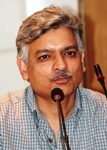 Khurshid Nadeem said we have not been able to proceed beyond the fundamental questions since 67 years. We are living in a modern nation state, but want to adjust centuries old traditions within this new paradigm, he said. He stressed on the need of strengthening and protection of the constitution.
Khurshid Nadeem said we have not been able to proceed beyond the fundamental questions since 67 years. We are living in a modern nation state, but want to adjust centuries old traditions within this new paradigm, he said. He stressed on the need of strengthening and protection of the constitution.

